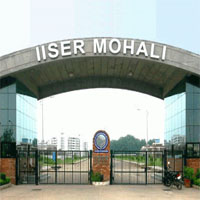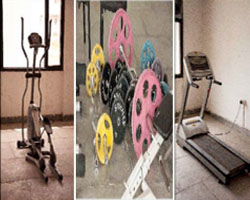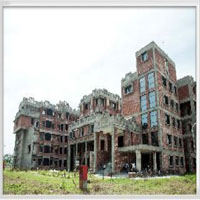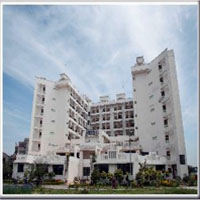 The ‘tri-city’ of Chandigarh-Mohali- Panchkula is one of India’s best cities to live and work in, by many different indices. It has often been ranked at the top of the country’s list of state capitals and union territories, in different analyses published by various magazines.
The ‘tri-city’ of Chandigarh-Mohali- Panchkula is one of India’s best cities to live and work in, by many different indices. It has often been ranked at the top of the country’s list of state capitals and union territories, in different analyses published by various magazines.
The IISER Mohali campus, covering an area of 125 acres, is situated in the south-east of Mohali, in Sector 81 (note : the numbering scheme for sectors is contiguous with the sectors of Chandigarh).
Currently, the campus consists of students’ hostels, faculty housing, one academic-cum- research block that is ready and functional (with another nearly ready), a lecture hall complex featuring multiple halls for the teaching of 125, 250, or 500 students at one time, a shopping complex for basic amenities (featuring a bank and a post-office), a library which combines print and digital books and journals, an informatics center, and a central analytical facilities building, featuring large and sophisticatedfacilities for inter-disciplinary research, such as high-field NMR, crystallography, mass spectrometry et cetera.
There are currently four hostels at IISER Mohali, each with a capacity of approximately 250 students. All rooms are for single occupation with attached balcony. Each floorhas six common washrooms. The hostels have mixed population of girls, boys, MS and PhD students; whereas the living sections for the genders are segregated, each hostel has a common TV room with attached canteen, as well as an attached mess for the main meals along with some other common areas for study and extra-curricular activities.
IISER Mohali has numerousclubs which organize different activities. Some of these are – the music and dance club, the sports club, the art club, the quizclub, the drama club, the environmental club, the adventure club and a YATN (Youths’ Attempt to Nurture) group that works to provide education to children of laborers involved in construction works at IISER.
Activities
 All the clubs are managed by students, creating a vibrant environment. So, if a student have a hobby, there will be definitely a place to put those interests, and skills, to use! And for those who want to learn, provided there are enough students, these clubs also organize classes. For example, in the past, guitar classes and Taekwondo classes have been organized for interested students. An inter-IISER sports week is organized once a year, in which students can compete in many different sports with students from other IISERs. Cultural evenings are frequently organized at IISER Mohali. During these, students display their talents to the entire campus community. Besides the clubs for extra- curricular activities, there is a Curie club, a Biology discussion forum (BDF), a physics forum called Phy@I and a mathematics group.
All the clubs are managed by students, creating a vibrant environment. So, if a student have a hobby, there will be definitely a place to put those interests, and skills, to use! And for those who want to learn, provided there are enough students, these clubs also organize classes. For example, in the past, guitar classes and Taekwondo classes have been organized for interested students. An inter-IISER sports week is organized once a year, in which students can compete in many different sports with students from other IISERs. Cultural evenings are frequently organized at IISER Mohali. During these, students display their talents to the entire campus community. Besides the clubs for extra- curricular activities, there is a Curie club, a Biology discussion forum (BDF), a physics forum called Phy@I and a mathematics group.
IISER Mohali currently has a basic gym facility. There are also spaces available for in-door games such as table tennis and badminton.The area at the center of the complex of four hostels has a basketball court and a volleyball play area, which are invariably occupied by students during the evenings, creating an atmosphere of energy and movement!
There is also a ground for football and cricket behind the area housing the hostels, with somebasic seating arrangements for viewers.
Library and computer center

The campus library houses all the books necessary for students required for their course work. Books can be issued and returned periodically, as in any library. The library also has e-journals and archives of most scientific journals, along with newspapers and magazines for leisure reading. The hostels also have a library for non-academic books for students, which may be issued like the course books. The digital library is situated within the Central Analytical Facility building which contains many computers with internet access for computer sciences students. Together with the institute Computer center, the library is due to move very soon into new premises – in a building glowing with natural lighting and an intriguing architectural plan.
Health Center

A medical officer is present at the IISER health center for 8 hrs each day, during weekdays, and there are visiting doctors too (a Physician and Surgeon, and a Gynecologist) who come to the health center at specific times during the week. The health center is equipped with basic medical amenities to provide immediate medical attention to students. Very soon, the health center is to move into new premises which will additionally also have a small multi-bedded nursing center. College life can be stressful and confusing at times for students staying away from home and experiencing challenging situations for the first time.
The institute has two capable counsellors who may be approached at any time for help. IISER Mohali also assigns one mentor (faculty member) to a group of students to help familiarize them with academic and social issues; at all times, during one’s campus stay, each student has an assigned mentor, although – for BS-MS students – the mentor assigned is different during the first two years of common studies, and during the remaining three years of specialization.
Shopping complex/Bank
The shopping complex has a few stores that attend to basic student needs along with a unisex salon. There is also a campus restaurant- currently called “Barawarchi”- at the shopping complex for dining. Canara bank has a branch situated in the complex, exclusively for IISER faculty, staff and students along with an ATM located near the hostels. IISER Mohali also has a visitors’ hostel where visiting family members of students may reside, along with visitors to the institute. In addition, there are two bus trips from the campus to the nearby market area every evening, making it easy for students to shop for daily needs unavailable in the campus shop(s).
Opportunities cell
An Opportunity Cell is present at IISER Mohali which is a joint student- faculty venture to inform students about options for summer/winter internships, PhD programs, scholarships available, and also some job opportunities. Although, currently, there is no provision for organizing any campus interviews, this cell aims to increase awareness about career opportunities among the students.
Academics and teaching labs
The department of Biology currently consists of 21 faculty members, during academic year 2014-2015. Classes take place either in the Lecture Hall Complex or in a classroom in the Academic Block. During extreme seasons, these classrooms are equipped with facilities of maintaining moderate temperatures.
The Lecture Hall Complex consists of six large classrooms, four with a capacity of seating 125, and two with a capacity of seating 250, along with a 500- seater auditorium and an E-classroom providing online course material and classes, including those held under the National Knowledge Network (NKN)
The first academic-cum-research block (AB-1) currently houses all departments, and consists of various areas segregated for research lab, teaching labs, offices, and classrooms. The biology teaching lab is large enough to handle 100 students at one time. The majors labs are equipped with basic instrumentation to demonstrate virtually every technique known to modern biology. There is a separate section in this brochure on these labs, which are called the HETeU-LEReU labs.
Students are exposed to experimental knowledge from various fields of structural and molecular biochemistry, molecular biology, developmental biology, cell biology, immunology, neuroscience, bioinformatics, molecular biophysics, computational biology, ecology, evolutionary biology, animal behavior, etc. using various model organisms like plants, bacteria, yeast, Drosophila and C. elegans etc. In addition to all these, there is also a 3-dimensional computational molecular visualization facility for introducing students to biomolecular structure and function.
The MS Biology major students need to take up certain mandatory courses every semester along with some electives, to complete their academic credits. A semester typically consists of 4-5 theory courses and one practical course, with two mid semester exams followed by a final exam. Ph.D students also need to take two semesters of courses, along with labs.
A weekly seminar series is conducted by the department which is a platform for Biology faculty members and PhD students to present their research work to their colleagues and students.
